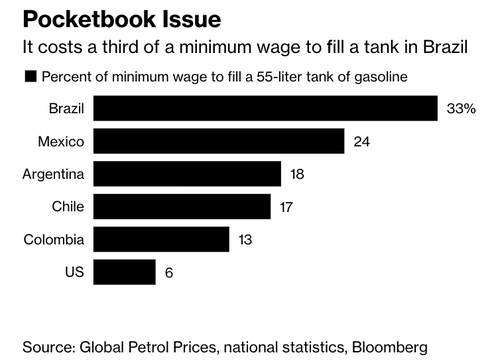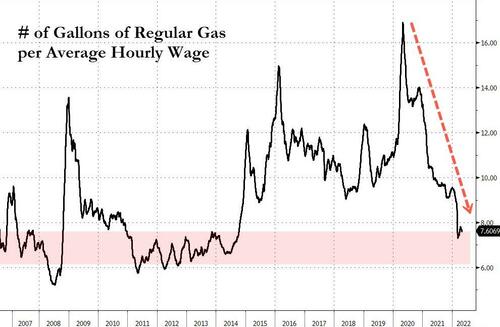
Soaring commodity prices have been financially devastating for households, devoting larger and larger shares of disposable income to pay for energy.
For instance, at nine California filling stations, the price of regular gas is higher than the federal minimum wage. Patrick De Haan of GasBuddy said several gas stations in Los Angeles and San Francisco metro areas had recorded pump prices over the federal minimum wage ($7.25). One station in Los Angeles is now $7.83.
Ed Yardeni of Yardeni Research told CBS News that record-high fuel costs are denting workers' paychecks. He estimated that the typical US household would spend upwards of $4,800 on gasoline this year, a $2,000 increase over last year. That financial burden is piling up for the working poor and households worldwide.
Bloomberg reports Brazilians are spending a whopping 33% of the monthly minimum wage to fill up a 14.5-gallon fuel tank. The figure is 24% in Mexico, 18% in Argentina, 17% in Chile, and 13% in Colombia.
The US isn't as bad, only 6%, though notice purchasing power of Americans has drastically fallen in the last two years. In April 2020, one hour of work bought over 17 gallows of Regular gasoline at the pump. Today, an hour of work will only buy 7 gallons of gas in America...
High fuel costs are rapidly eating away at Brazilian wages, causing President Jair Bolsonaro's popularity to sour. The president has supported legislation to lower taxes and fired three chiefs of the state-controlled oil company Petroleo Brasileiro SA because of high fuel costs.
In Europe, natural gas and electricity bills are expected to jump from 3.5% to 4.5% of household disposable income. The share of an energy bill that households have to pay continues to increase as Europe's transition from Russian fossil fuels is bumpy, filled with shortages and elevated prices. This figure doesn't even include petrol prices at the pump.
The cost of living is hitting a painful threshold for many working-class folks worldwide and has also sparked social instabilities in several countries. Turbulent times are ahead as inflation riots spread as soaring energy and food costs consume disposable incomes.
Soaring commodity prices have been financially devastating for households, devoting larger and larger shares of disposable income to pay for energy.
For instance, at nine California filling stations, the price of regular gas is higher than the federal minimum wage. Patrick De Haan of GasBuddy said several gas stations in Los Angeles and San Francisco metro areas had recorded pump prices over the federal minimum wage ($7.25). One station in Los Angeles is now $7.83.
Ed Yardeni of Yardeni Research told CBS News that record-high fuel costs are denting workers’ paychecks. He estimated that the typical US household would spend upwards of $4,800 on gasoline this year, a $2,000 increase over last year. That financial burden is piling up for the working poor and households worldwide.
Bloomberg reports Brazilians are spending a whopping 33% of the monthly minimum wage to fill up a 14.5-gallon fuel tank. The figure is 24% in Mexico, 18% in Argentina, 17% in Chile, and 13% in Colombia.
The US isn’t as bad, only 6%, though notice purchasing power of Americans has drastically fallen in the last two years. In April 2020, one hour of work bought over 17 gallows of Regular gasoline at the pump. Today, an hour of work will only buy 7 gallons of gas in America…
High fuel costs are rapidly eating away at Brazilian wages, causing President Jair Bolsonaro’s popularity to sour. The president has supported legislation to lower taxes and fired three chiefs of the state-controlled oil company Petroleo Brasileiro SA because of high fuel costs.
In Europe, natural gas and electricity bills are expected to jump from 3.5% to 4.5% of household disposable income. The share of an energy bill that households have to pay continues to increase as Europe’s transition from Russian fossil fuels is bumpy, filled with shortages and elevated prices. This figure doesn’t even include petrol prices at the pump.
The cost of living is hitting a painful threshold for many working-class folks worldwide and has also sparked social instabilities in several countries. Turbulent times are ahead as inflation riots spread as soaring energy and food costs consume disposable incomes.







